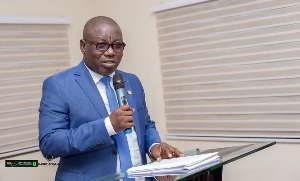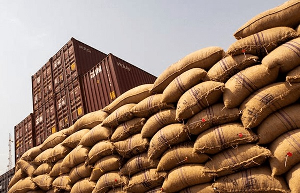Tema, Sept. 19, GNA - Nana Akuoko Sarpong, Legal and Cultural Consultant, has stressed the need for a total and holistic approach to the solution of the energy crisis currently facing the nation.
"The country's energy problem has so much to do with the policy direction of our future which must be the concern of every well-meaning citizen," he pointed out.
Nana Sarpong made the call in a research he conducted on the country's energy situation, a copy of which was made available to the Ghana News Agency on Monday.
He said his position on addressing Ghana's energy problem should not be interpreted as a 93grandstanding=94. Nana Sarpong, who was a Minister of State in the PNDC/NDC government, urged Ghanaians to see power supply as a national priority devoid of all the division tendencies that 93the over-politicization of national affairs evokes.=94
In the research report was titled: "Ghana's Energy Crisis: The need for energy policy for the next 50 to 100 Years - Akosombo and Nkrumah's Vision," Nana Sarpong held that Ghana required more than 10 times the present volume of power supply to sustain the citizenly for another 50 to 100 years, if the nation could develop as an industrial power in the sub-region.
"The stark truth is that it is the combined effect of the two major dams built by Burkina Faso which take their source from the upper reaches of the Volta River which has adversely affected the flow of water into the Akosombo Dam,=94 he pointed out.
He welcomed the West African Gas Pipeline Project, saying it may sooner or later become a reality to augment power supply, but suggested that the project be incorporated as a supplement to the national policy. Nana Sarpong, who is also the Paramount Chief of the Agogo Traditional Area, noted with regret that the Bui Dam Project had been on the drawing board since Dr Kwame Nkrumah's Akosombo was opened with succeeding governments only paying lip service to it.
Nana Sarpong advocated a National Conference of all agencies involved in power supply, as well as representatives of political parties to agree on a common energy policy.
The policy, the Agogohene contended, must be binding on all interest groups.
He suggested that at such a forum, fuel pricing should be top on the agenda for discussion, 'so that all parties will agree to take either Kume Preko, Yabre or Wahala out of our political lexicon".
"If we as a people are to reverse the worsening trend of the urban-rural divide, then we must have a national policy on utility pricing across board, including water, electricity and fuel so that no political party would take advantage of the other'.
As a follow-up of the National Conference on the National Common Policy on Energy, Nana Sarpong was of the view that a Sub-Regional Conference on Energy Supply be convened at which those who would be involved with these processes should be prepared to take responsibility for their actions and 93not to dance round the problems with conference after conference and seminar after seminar.
The Legal and Cultural Consultant advocated that such a Conference be held off camera in order to avoid the scoring of points. =93For once, we must learn to lock ourselves in a room to find our own solution to a problem that threatens our future existence, and invite others to assist in the implementation, and not the other way round.'
The Conference, he said, must look at ways and means of concretizing the existing West African Power Pool.
=93We should strive to convince our neighbours that it is in their interest as much as ours, that the power systems of all the countries in the sub-region be fully inter-connected and integrated into a pool where countries can draw power from each other.'
This, in his view, would give a real meaning to sub-regional integration.
Nana Sarpong proposed the setting up of an international authority known as the 93Volta Basin Authority=94 by the three countries through which the Volta River and its tributaries flow, namely, Burkina Faso, Togo and Ghana.
This, he said, could help the three nations to determine the usage of the Volta River Waters, coordinate and harmonize such activities for their mutual benefits. 19 Sep 06
General News of Tuesday, 19 September 2006
Source: GNA












